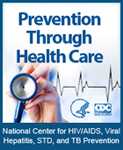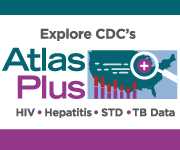New CDC Campaign Aims to Stem HIV Crisis among Black Women
Press Release
For immediate release: March 8, 2012
Media Contact: NCHHSTP – News Media Line, +1-404-639-8895, NCHHSTPMediaTeam@cdc.gov
To combat the high toll of HIV and AIDS among black women in the United States, the Centers for Disease Control and Prevention today launched Take Charge. Take the Test., a new campaign to increase HIV testing and awareness among African-American women. The campaign – which features advertising, a website and community outreach – is being launched in conjunction with National Women and Girls HIV/AIDS Awareness Day in 10 cities where black women are especially hard-hit by the disease.
“At current rates, nearly 1 in 30 African-American women will be diagnosed with HIV in their lifetimes,” said Kevin Fenton, M.D., director of CDC’s National Center for HIV/AIDS, Viral Hepatitis, STD and TB Prevention. “To help reduce this toll we are working to remind black women that they have the power to learn their HIV status, protect themselves from this disease, and take charge of their health.”
The program is being launched in Atlanta; Chicago; Detroit; Fort Lauderdale, Fla.; Houston; Memphis, Tenn.; Newark, N.J.; New Orleans; Hyattsville, Md.; and St. Louis.
Take Charge. Take the Test. is part of CDC’s commitment to address the urgent HIV prevention needs of African-American women, who are far more heavily affected by HIV and AIDS than women of any other race or ethnicity in the United States. African-American women account for nearly 60 percent of all new HIV infections among women (and 13 percent of new infections overall). The rate of new infections among black women is 15 times higher than among white women.
The campaign emphasizes the importance of HIV testing as a gateway to peace of mind and better health. Campaign messages will reach black women through a variety of highly visible channels, including outdoor and transit advertising; radio ads; posters and handouts distributed in salons, stores, community organizations, and other venues; campaign ads and materials on health department and partner websites; and a dedicated campaign website, http://hivtest.org/takecharge, where women can find HIV testing locations in their communities.
In addition to promoting HIV testing, the campaign encourages African-American women to talk openly with their partners about HIV and insist on safe sex, and to bring these same messages to other women in social settings, workplaces, living rooms, and religious congregations.
Take Charge. Take the Test. reflects a strong partnership between CDC, health departments, and local organizations in the 10 participating cities, which worked together to develop local campaigns for the communities they serve. The campaign was initially piloted in Cleveland and Philadelphia, where Take Charge. Take the Test. community events were attended by nearly 10,000 women, and campaign messages were seen more than 100 million times.
“We hope to extend the reach of this campaign to multiple cities throughout the nation, help empower many more women to take control of their health, and help break the silence about HIV in their communities,” said Jonathan Mermin, M.D., director of CDC’s Division of HIV/AIDS Prevention (DHAP).
Research shows that black women are no more likely than women of other races to engage in risky behaviors. But a range of social and environmental factors put them at greater risk for HIV infection. These include higher prevalence of HIV and other sexually transmitted infections in some black communities, which increase the likelihood of infection with each sexual encounter. Limited access to health care can prevent women from getting HIV tested. Research also shows that financial dependence on male partners may limit some women’s ability to negotiate safe sex. HIV stigma, far too prevalent in all communities, may also discourage black women from seeking HIV testing.
“This campaign is just one part of the solution,” said Donna Hubbard McCree, Ph.D., associate director for health equity at DHAP. “All of us have a role to play in stopping the spread of HIV among black women – by talking to our sisters, daughters, husbands, and boyfriends about how to protect ourselves against HIV and the importance of getting tested; by speaking out against stigma; and by tackling the social inequities that place so many of us at risk for HIV.”
Take Charge. Take the Test. is the latest campaign of CDC’s Act Against AIDS initiative (http://actagainstaids.org) a five-year, $45 million national communication campaign to combat complacency about the HIV/AIDS crisis in the United States. The campaign also directly addresses the goals of the National HIV/AIDS Strategy, which calls for reducing new infections, intensifying HIV prevention efforts in communities in which HIV is most heavily concentrated, and reducing HIV-related deaths in communities at high risk for HIV infection. Other Act Against AIDS campaigns include those targeting high-risk populations such as gay and bisexual men, as well as efforts to reach health care providers and the general public.
For more information visit: www.hivtest.org/takecharge.
###
- Page last reviewed: March 8, 2012
- Page last updated: December 20, 2013
- Content source:


 ShareCompartir
ShareCompartir

